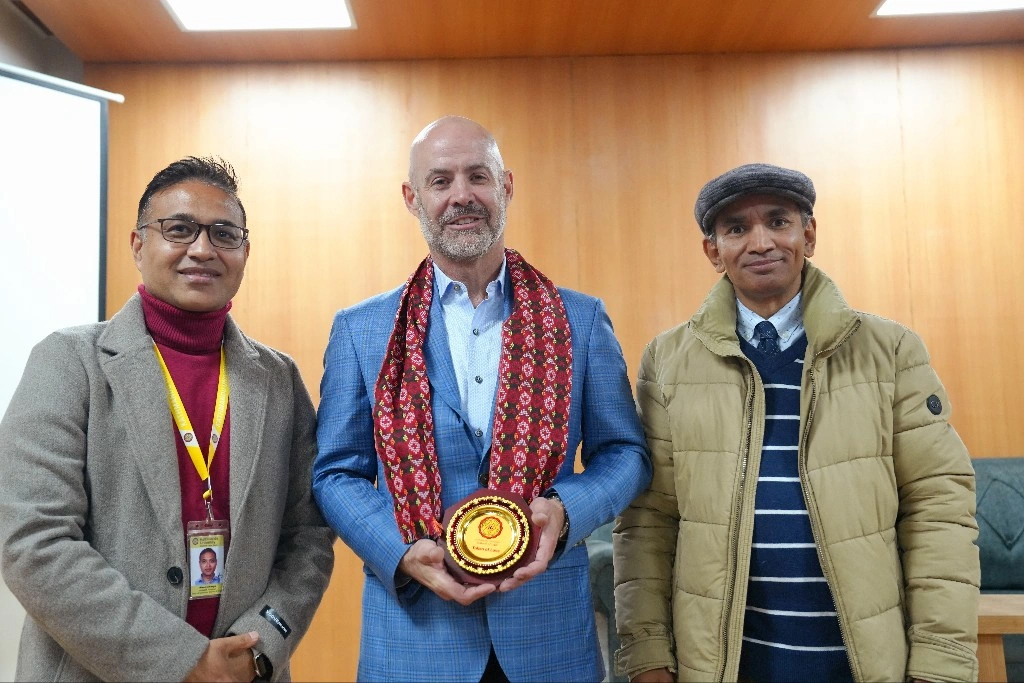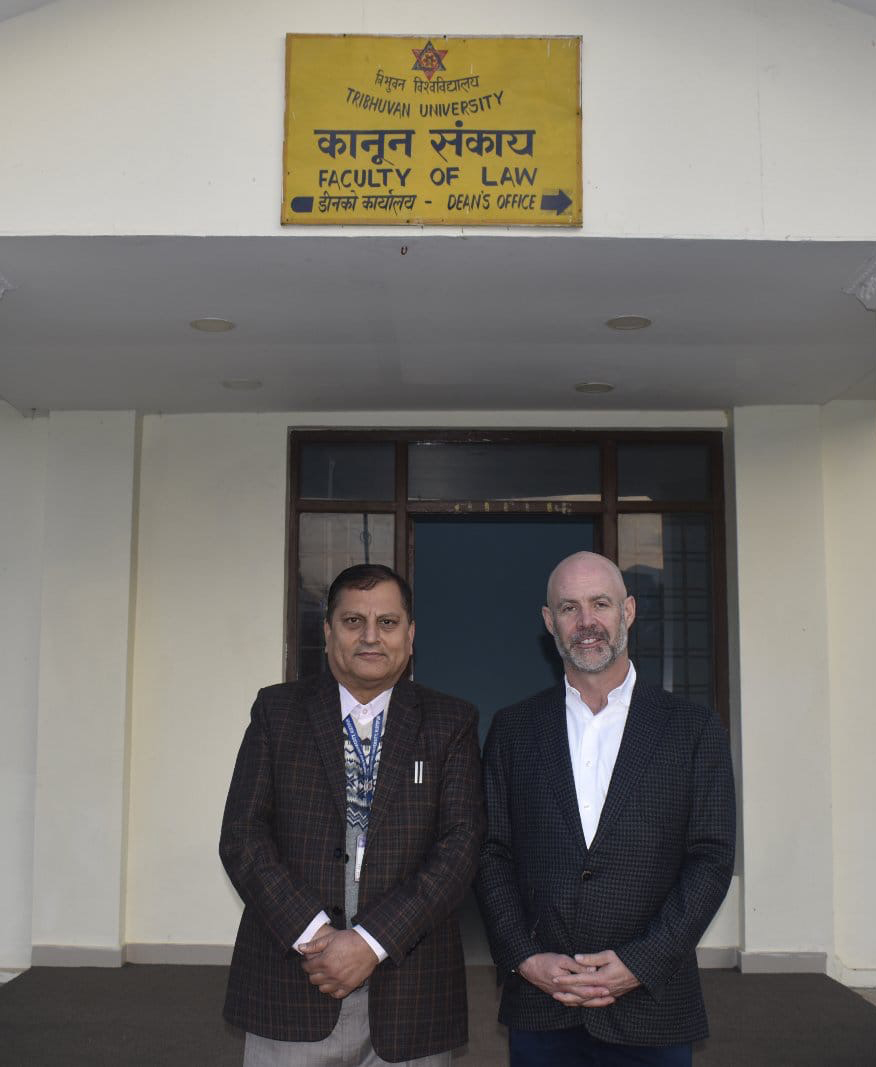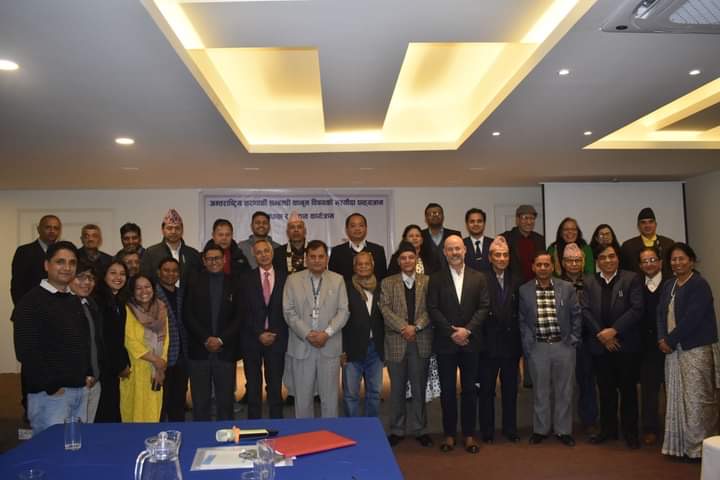
By Gwyneth K. Shaw
Berkeley Center for Law & Technology (BCLT) Executive Director Wayne Stacy has spent decades immersed in the development of American tech law, aiding and monitoring the evolution of everything from patent rules to artificial intelligence. As a top patent litigator, leader of the U.S. Patent and Trademark Office’s West Coast branch, in the classroom, and most recently at the helm of UC Berkeley Law’s technology hub, Stacy’s been positioned at the intersection of innovation and this country’s legal and governmental principles.
But what if a country didn’t have that history to rely on — not just regarding longstanding principles guaranteeing freedom of speech and assembly, but also questions about where a resource-limited nation should invest?
Stacy got the chance to find out in December, when he visited Tribhuvan University in Kathmandu, Nepal, as a Fulbright Specialist, part of a U.S. Department of State program. Over just 30 days, Stacy helped the law faculty at Tribhuvan — which oversees Nepal’s public legal-education system — build out a brand-new tech law curriculum for all of the country’s public law schools.
Dueling perspectives
The experience, Stacy says, was fascinating for multiple reasons: The chance to observe another culture closely and understand its internal and external political pressures; an opportunity to discuss which legal topics best fit their current and future needs; and a chance to reflect on how countries that are just developing technology sectors should use rules and regulations formed in places, like the European Union and the U.S., that have been working on the topics for many years.

“It came down to not telling them how to do things, but making it clear that this is how the world has designed these programs, all the way from privacy to AI,” he says. “For example, Europe has its own privacy abuses from the 1940s, ’50s, and ’60s that Nepal doesn’t necessarily share. Seeing this different perspective helped me re-center, but it also made it clear that maybe as academics, we need to take a step back when dealing with developing economies and tech regulation.
“A lot of countries are developing these laws from scratch because they’re just now facing these tech issues, and just adopting regulatory approaches wholesale from other nations is not always going to work.”
At the same time, the pace of innovation in Nepal — wedged between the twin technology powerhouses of China and India — means the nation’s master’s of law (LL.M.) students needed a framework for understanding and developing tech law. Tribhuvan was the linchpin for the curriculum development since the government, universities, and judiciary are stocked with its graduates, Stacy explains.
“They’re facing many problems that we first faced 10 to 20 years ago — and now they can look at what the rest of the world has and is doing,” he says. “For the proposed curriculum, we jointly developed a comparative law program that will allow their students to analyze what the U.S., China, the European Union, and India have been doing on issues like content moderation, data regulation, privacy protection, and freedom of speech.”
A need for nuance
The European tech-regulation model is heavy handed, while the U.S. has a lighter hand, Stacy notes. Similarly, India has a lighter hand and more of an innovation focus, rather than something that’s strongly protection-focused.
“Where should Nepal fit along that spectrum? Of course, that is Nepal’s decision,” he says. “The proposed curriculum simply provides a foundation for their students to see global approaches and results.”
Because the curriculum will be used for many years, Stacy adds, there’s room for growth and change in the class structure as the technology sector evolves. He plans to stay involved and hopes to bring some of the ideas and comparisons generated during the process into the UC Berkeley Law and BCLT worlds.

Stacy donated his Fulbright stipend to the university so it could purchase a Zoom teaching setup that will allow guest speakers from outside Nepal to reach into the school’s classrooms and interact with their students. As the sector continues to change, he says, law students around the world will benefit from comparing perspectives — and he wants UC Berkeley Law students to gain from that as well.
“I love the technology, and it’s perfect for a place like Nepal, where travel is difficult and there aren’t the resources to bring outside scholars into the classroom that often,” he says. “Students really benefit from hearing the perspectives of experts from around the world. In a comparative class, lots of people can teach a component, but I’ve never met anybody that can teach all the individual pieces well.”
While the workload was heavy — Nepal has six-day work weeks — Stacy did get the chance to see some of the country. He made a visit to Mount Everest’s base camp and, having grown up farming himself, enjoyed touring the countryside to see how agriculture works there and “get a feel for where technology is still irrelevant.”
Even in some of the most isolated places, though, technology was a source of wonder.
“I was at a hostel just short of base camp, and I had four bars and 5G on my phone — I could take a video and text it to my wife,” Stacy says. “I had better coverage than I do in the middle of Silicon Valley.”